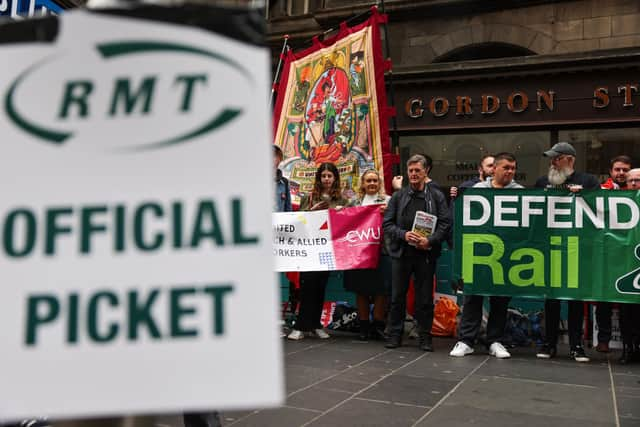Train strikes 2023: When are August Bank holiday weekend and September walkouts by RMT and ASLEF staff?
and live on Freeview channel 276
Londoners are set to face travel chaos at the end of the summer holidays as rail workers stage a fresh round of strike action.
The Rail, Maritime and Transport union (RMT) said 20,000 of its members in 14 train operators would walk out on two consecutive Saturdays.
Advertisement
Hide AdAdvertisement
Hide AdThis includes the August bank holiday, which will affect people travelling to Notting Hill Carnival, All Points East and the Reading Festival.
ASLEF (Associated Society of Locomotive Engineers and Firemen), members will take industrial action at the beginning of next month.
National Rail warns passengers to expect “significant disruption” on strike days.
When are the strikes happening?
RMT members will walkout on Saturday August 26 and Saturday September 2 as part of an ongoing dispute over pay, jobs and conditions.
Advertisement
Hide AdAdvertisement
Hide AdASLEF members from 16 train companies will strike on Friday September 1. The union has also announced a further overtime ban across the UK rail network on Saturday September 2.
Which train companies are affected?
The 14 train operating companies affected by the RMT strikes are: Chiltern Railways, Cross Country Trains, Greater Anglia, LNER, East Midlands Railway, c2c, Great Western Railway, Northern Trains, South Eastern, South Western Railway, Transpennine Express, Avanti West Coast, West Midlands Trains and GTR, including Gatwick Express.
The 16 companies affected by the ASLEF strikes include: Avanti West Coast; Chiltern Railways; c2c; CrossCountry; East Midlands Railway; Greater Anglia; GTR Great Northern Thameslink; Great Western Railway; Island Line; LNER; Northern Trains; Southeastern; Southern/Gatwick Express; South Western Railway; TransPennine Express; and West Midlands Trains.


Why are RMT members striking?
RMT members are striking after “no improved or revised offer from the Rail Delivery Group”.
Advertisement
Hide AdAdvertisement
Hide AdRMT general secretary Mick Lynch said: “The reason for this is the government has not allowed them a fresh mandate on which discussions could be held.
“Our members and our union will continue fighting until we can reach a negotiated and just settlement.”
All RMT members involved in the dispute will not book on for any shifts on the days where strike action is planned, the union said.
Why are ASLEF members striking?
ASLEF says its members are striking as the government has “refused” to sit down and talk to them and have not made a “fair and sensible” pay offer to train drivers.
Advertisement
Hide AdAdvertisement
Hide AdThe Rail Delivery Group offered a 4% pay rise in 2022 followed by another 4% rise in 2023, but general secretary Mick Whelan said the proposal “was clearly not designed to be accepted” as inflation is much higher, meaning the offer represents a pay cut in real terms.
“They are happy to let this drift on and on. But we are determined to get a fair pay rise for men and women who haven’t had one for four years while inflation has reached double figures. Our members, perfectly reasonably, want to be able to buy now what they could buy back in 2019,” he said.
What do the train operators say?
A Rail Delivery Group spokesperson said staff were offered a 13% pay rise which was “blocked without a convincing explanation” by the RMT executive.
“With further strike action the RMT are once again targeting customers looking to enjoy various sporting events, festivals, and the end of the summer holidays, disrupting their plans and forcing more cars onto the road,” the spokesperson said.
Advertisement
Hide AdAdvertisement
Hide Ad“We have now made three offers, the latest of which would have given staff pay rises of up to 13% as well as job security guarantees and the RMT executive have blocked this without a convincing explanation.
“We remain open to talks and we have said repeatedly that we want to give our people a pay rise, but until the union leadership and executive is united in what it wants and engages in good faith with the 30% shortfall in revenue the industry is continuing to grapple with post-Covid, it is difficult to move forward.
“Unfortunately, the repercussion of this impasse affects our staff, customers, and the communities across the country that rely on the railway.”
What is the government saying?
A Department for Transport spokesperson said: “The RMT leadership’s decision to call more strikes and cynically target the travelling public over the bank holiday weekend is disappointing. The government has facilitated fair and reasonable pay offers.
Advertisement
Hide AdAdvertisement
Hide Ad“However, union bosses are opting to prolong this dispute by blocking their members from having a vote on these offers. We continue to urge that members are given their say and disruption is brought to an end.”
Comment Guidelines
National World encourages reader discussion on our stories. User feedback, insights and back-and-forth exchanges add a rich layer of context to reporting. Please review our Community Guidelines before commenting.
